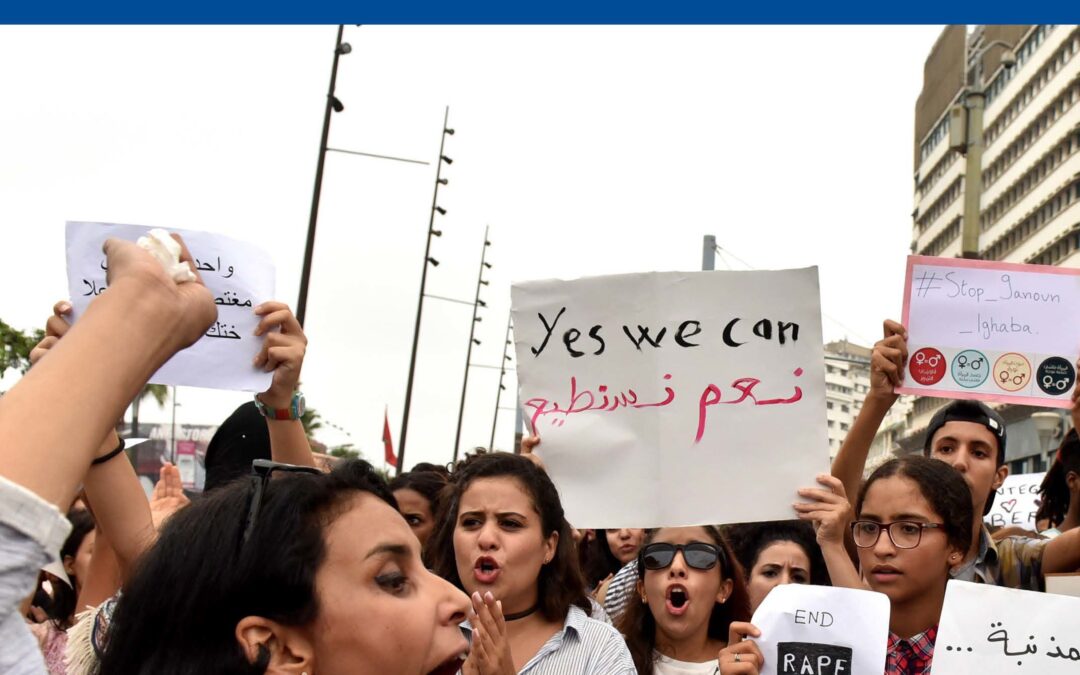
Morocco: remove obstacles to women’s and girls’ access to justice for sexual and gender-based violence – New ICJ report
In a report released today in Rabat, the ICJ called for the removal and eradication of legal obstacles and discriminatory judicial attitudes hindering women’s and girls’ ability to seek justice and redress for sexual and gender-based violence (SGBV) in Morocco.
The ICJ’s report Obstacles to Women’s and Girls’ Access to Justice for Gender-based Violence in Morocco (available in English and Arabic) explores the various obstacles that women seeking justice in Morocco face, and addresses recommendations to the Moroccan government and judiciary with a view to improving access to justice and effective remedies for women and girls who are victims of SGBV.
“The Moroccan authorities should amend Law 103/13 and the Penal Code to ensure compliance with international human rights law and standards. Morocco’s Office of the Public Prosecutor and the country’s judicial authorities, including the High Judicial Council, should ensure that detailed guidelines on investigation and prosecution of SGBV crimes are developed and complied with, and that awareness-raising programmes be rolled out to counter judicial stereotyping and victim-blaming,” said Saïd Benarbia, Director of the Middle East and North Africa Programme at the ICJ.
Notwithstanding the recent adoption of Law 103/03 on combatting violence against women, SGBV has not been adequately addressed; it remains widespread in Morocco, with a profoundly detrimental human rights impact on victims and society at large. Law 103/3 fails to define rape in a manner consistent with relevant international law and standards, with the crime still addressed through the lens of morality and public decency, rather than as a violation of one’s bodily integrity and autonomy; Law 103/3 also fails to criminalize child and early marriage, lending support to this harmful practice.
In addition to discriminatory laws and procedures, women and girls seeking justice and redress as survivors of SGBV in Morocco have to face a judiciary that often harbours biased assumptions, and propounds negative gender stereotypes, including cultural norms rooted in patriarchy.
Against this background, the ICJ’s report analyses how exceedingly lenient sentences – for instance in cases of marital rape – and the heightened risk women and girls face of being charged with consensual extramarital sexual relations deter them from seeking justice and redress in case of physical and sexual abuse of which they may be victims, either at the hands of their husband or of individuals with whom they are not married.
To begin addressing women’s and girls’ predicament in these and other respects related to SGBV, the report calls on the Moroccan authorities to:
- Adopt legislation that recognizes one’s right to sexual autonomy, and that recognizes equal relationships as requiring free and full consent of both parties;
- Adequately define and fully criminalize through a gender-neutral definition acts of rape, including by criminalizing marital rape as a separate offence;
- Repeal Article 490 of the Penal Code criminalizing extramarital sexual relations, and ensure that Article 19 of the Family Code on the minimum age of marriage is stringently observed;
- Enact policies, legislative and procedural measures aiming at enhancing the effectiveness of judicial and other public sector services related to women’s access to justice, including enforcing spousal and child support, providing free legal assistance to victims of SGBV, granting protection orders, and adopting other urgent measures;
- Develop and enforce guidelines on investigating and prosecuting SGBV crimes;
- Develop a national protocol for SGBV-related medical, forensic examinations, and ensure forensic-testing services be available and affordable;
- Provide training and awareness-raising programmes aimed at countering judicial stereotyping, victim-blaming and other harmful practices.
Contact:
Saïd Benarbia, Director of the ICJ Middle East and North Africa Programme, t: +41.22.979.3817, e: said.benarbia(a)icj.org
Additional information:
ICJ Commissioner Martine Comte led the delegation that met with different Moroccan authorities, justice and civil society actors this week in Rabat in order to present ICJ’s report and discuss its findings and recommendations. The ICJ delegation met with Mr Mohamed Aujjar, Minister of Justice; Mr Taoufik El Maimouni, President of the Commission on Justice, Legislation, and Human Rights at the Chamber of Deputies; Mr Larbi Tabit, Secretary General at the Minister of Solidarity, Women, Family and Social Development; Ms Amina Bouayach, President of the National Human Rights Council and representatives of the judiciary and of the civil society.
Download:
Morocco-Obstacles GBV-Publications-Reports-Thematic report-2019-ENG (full report in English, PDF)
Morocco-Obstacles GBV-Publications-Reports-Thematic report-2019-ARA (full report in Arabic, PDF)
Morocco-Women HR report-News-2019-ARA (News story in Arabic, PDF)
